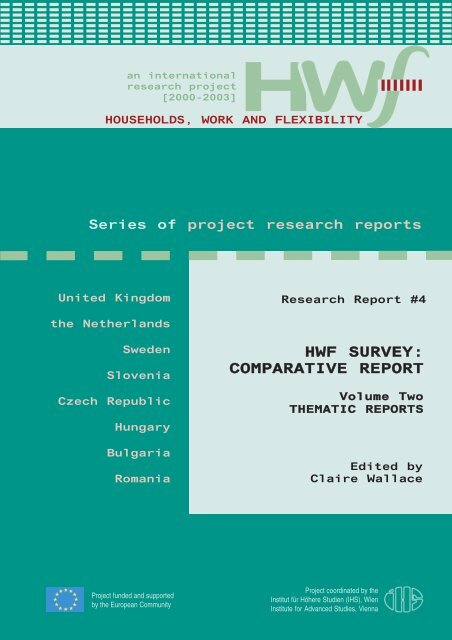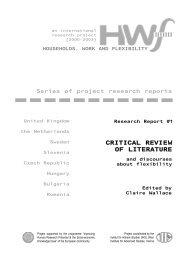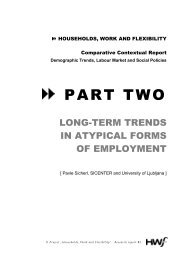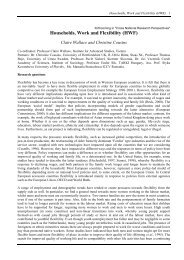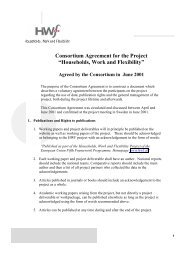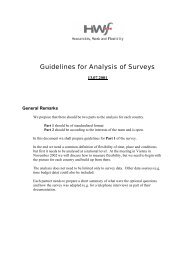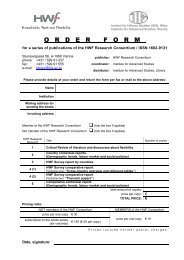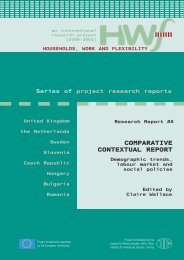You also want an ePaper? Increase the reach of your titles
YUMPU automatically turns print PDFs into web optimized ePapers that Google loves.
HOUSEHOLDS, WORK AND FLEXIBILITY<br />
Series of project research reports<br />
United Kingdom<br />
the Netherlands<br />
Sweden<br />
Slovenia<br />
Czech Republic<br />
an international<br />
research project<br />
[2000-2003]<br />
Hungary<br />
Bulgaria<br />
Romania<br />
Project funded and supported<br />
by the European Community<br />
Research Report #4<br />
<strong>HWF</strong> SURVEY:<br />
COMPARATIVE REPORT<br />
Volume Two<br />
THEMATIC REPORTS<br />
Edited by<br />
Claire Wallace<br />
Project coordinated by the<br />
Institut für Höhere Studien (IHS), Wien<br />
Institute for Advanced Studies, Vienna
HOUSEHOLDS, WORK AND FLEXIBILITY<br />
Series of project research reports<br />
United Kingdom<br />
the Netherlands<br />
Sweden<br />
Slovenia<br />
Czech Republic<br />
an international<br />
research project<br />
[2000-2003]<br />
Hungary<br />
Bulgaria<br />
Romania<br />
Project supported by the programme “Improving<br />
Human Research Potential & the Socio-economic<br />
Knowledge base” of the European Community<br />
Research Report #4<br />
<strong>HWF</strong> SURVEY:<br />
COMPARATIVE REPORT<br />
Volume Two<br />
THEMATIC REPORTS<br />
Edited by<br />
Claire Wallace<br />
Project coordinated by the<br />
Institut für Höhere Studien (IHS), Wien<br />
Institute for Advanced Studies, Vienna
Annotation<br />
This volume "<strong>HWF</strong> Survey Comparative Report Volume 2" is the second volume of the fourth publication in a series of research<br />
reports being produced within the framework of the multinational research project "Households, Work and Flexibility".<br />
Individual chapters in the report provide a detailed analysis of the various themes and problems covered by the project divided<br />
according to flexibility and family-work relations on a comparative basis. The countries covered are: three EU-member states<br />
(United Kingdom, the Netherlands and Sweden) and five Applicant countries (Slovenia, Czech Republic, Hungary, Bulgaria and<br />
Romania).<br />
Acknowledgements<br />
The contents of this publication do not necessarily reflect the opinion or position of the European Commission.<br />
We would like to thank the sponsors of the project: Directorate-General Research at the European Commission and especially<br />
Mrs. Fadila Boughanemi for funding and supporting the project. We would also like to thank the Austrian Ministry for Science,<br />
Education and Art for additional support and the staff at the Bureau for International Research and Technology Co-operation for<br />
their helpful advice.<br />
We are also grateful to Dr. Sergei Nagaev for thorough processing, harmonization and cleaning of <strong>HWF</strong> Survey data sets, Mr.<br />
Radu Dobreci for his help with the layout of the published reports and to Dr. Alexander Chvorostov for his energetic and careful<br />
guidance and editing of <strong>HWF</strong> research reports.<br />
© the <strong>HWF</strong> Research Consortium Reproduction is authorized provided the source is acknowledged<br />
<strong>HWF</strong> Project Co-ordinator Prof. Claire Wallace (IHS, Austria)<br />
Team leaders Christine Cousins (United Kingdom)<br />
Yvonne Kops (the Netherlands)<br />
Thomas Boje (Sweden)<br />
Pavle Sicherl (Slovenia)<br />
Jiři Večernik (Czech Republic)<br />
Endre Sik (Hungary)<br />
Siyka Kovacheva (Bulgaria)<br />
Manuela Stanculescu (Romania)<br />
Contact details for <strong>HWF</strong> Partners are provided on the third page of the cover<br />
ISSN 1682-9131<br />
Published by the <strong>HWF</strong> Research Consortium <br />
Coordinated and distributed by the Institute for Advanced Studies / Institut für Höhere Studien (IHS),<br />
Stumpergasse 56, A-1060 Vienna, Austria <br />
Publication manager and editor Alexander Chvorostov <br />
Original design of the series by Wolfgang Weitlaner <br />
Technical layout by Radu Dobreci <br />
First published in November 2003<br />
Printed by facultas digitaldruck, Augasse 2-6, 1090 Wien <br />
Project funded by the European Community under the FP5 programme “Improving<br />
Human Research Potential & the Socio-economic Knowledge Base”<br />
Contract № HPSE-CT-1999-0030<br />
Project № SERD-1999-00178
TABLE OF CONTENTS<br />
INTRODUCTION<br />
Overview: <strong>HWF</strong> Survey comparative papers ............. [ 5 ]<br />
© Project „Households, Work and Flexibility”. Research report #4, Volume 2<br />
PART ONE<br />
<strong>HWF</strong> Survey results: Labour market flexibility<br />
Chapter 1 Socio-economic status and patterns of work flexibility .................[ 9 ]<br />
Chapter 2 Are the flexible working arrangements across<br />
Europe worse that regular employment?....................................[ 35 ]<br />
Chapter 3 How much work flexibility is there<br />
in Eastern and Western Europe?................................................[ 69 ]<br />
Chapter 4 Are Swedish workers less flexible than the Dutch<br />
and British workers or are the three markets just<br />
characterized by different patterns of flexibility?.......................[ 109 ]<br />
Chapter 5 Work and job values in CEE and EU countries ........................[ 129 ]<br />
Chapter 6 An analysis of non-standard employment and<br />
working time arrangements in the Czech Republic<br />
and Hungary .............................................................................[ 147 ]<br />
Chapter 7 Flexible work and young people’s labour market<br />
integration in the process of globalization.................................[ 169 ]<br />
PART TWO<br />
<strong>HWF</strong> Survey results: Family-work relations<br />
Chapter 8 Working time, gender and family:<br />
an East-West European comparison........................................[ 205 ]<br />
Chapter 9 Working time, flexibility and family life<br />
in the UK, the Netherlands and Sweden...................................[ 225 ]<br />
Chapter 10 The work-family balance for couples in Europe<br />
A comparative analysis on combination pressure<br />
in six European countries .........................................................[ 247 ]<br />
Chapter 11 Does family friendly policy influence the costs<br />
of being flexible?.......................................................................[ 279 ]<br />
Chapter 12 The reconciliation of work and family obligations:<br />
A comparison between Austria, the Netherlands<br />
and Sweden..............................................................................[ 297 ]<br />
ANNEX<br />
Summary of the <strong>HWF</strong> Survey fieldwork [ III ] Brief information on authors [ V ]<br />
Related publications of Consortium Members [ VII ] Order Form and Prospectus [ XIII ]
© Project „Households, Work and Flexibility”. Research report #4, Volume 2
Chapter Two. Are the flexible working arrangements across Europe… 5<br />
Introduction<br />
HOUSEHOLDS, WORK AND FLEXIBILITY<br />
Survey Comparative Report<br />
(Volume 2: Thematic Reports)<br />
Overview: <strong>HWF</strong> Survey comparative papers<br />
The <strong>HWF</strong> survey comparative reports (thematic<br />
papers) constitute Deliverable number 13 (Workpackage<br />
# 6) of project Households, Work and Flexibility<br />
funded by the European Commission under<br />
the Fifth Framework Programme contract no.<br />
HPSE-1999-00030. The project extends from April<br />
2000 to April 2003. We are grateful to the Commission<br />
for their support of this work. Further<br />
information can be found on the homepage of the<br />
project 1. Many documents can be downloaded<br />
cost free at that address; the full collection <strong>HWF</strong><br />
research reports 2 (five issues) can be purchased<br />
from the library of the coordinating institution<br />
IHS-Vienna 3.<br />
This report is the second volume of the comparative<br />
report on the surveys. The first volume 4<br />
examines standardised cross-tabulation tables for<br />
many variables analysed. The given report uses<br />
more refined and multivariate analysis to focus on<br />
particular topics in detail. The 12 papers presented<br />
here are divided into two groups:<br />
Part One is about labour market flexibility;<br />
Part Two looks at family-work interactions.<br />
[ Claire Wallace, Institute for Advanced Studies, Vienna ]<br />
The countries covered in the comparative data set<br />
are: the UK, Sweden, the Netherlands, Slovenia,<br />
Czech Republic, Hungary, Romania and Bulgaria.<br />
Some papers focus on only a part of these countries.<br />
The project is designed to look at the relationship<br />
between households and the kinds of<br />
work undertaken by households, including all the<br />
family members and using a broad definition of<br />
work to include both paid and unpaid labour.<br />
The project considers the role of flexibility in this<br />
context and for this purpose we have defined<br />
flexibility as that of time, place and conditions.<br />
That is, we are considering flexible hours of work,<br />
flexible place of work and various contractual<br />
conditions.<br />
The countries chosen were intended to be illustrative<br />
of different policy approaches to flexibilisation<br />
and the work-family balance. However,<br />
we have also endeavoured to compare Western<br />
European EU countries with a range of Eastern<br />
European candidate countries in this analysis to<br />
understand the effect of such trends across<br />
© Project „Households, Work and Flexibility”. Research report #4, Volume 2
6 Report #4: <strong>HWF</strong> Survey comparative reports (Volume 2: Thematic reports)<br />
Europe generally. Consequently, the countries<br />
chosen were Sweden, the UK, the Netherlands,<br />
Slovenia, the Czech Republic, Hungary, Romania<br />
and Bulgaria. The research team represents a<br />
cross-disciplinary group of sociologists, economists,<br />
educationalists and social policy specialists.<br />
The main research instruments are a quantitative<br />
representative sample survey in each country<br />
and an analysis of policies and labour market<br />
trends. The survey was carried out in the first<br />
half of 2001 and involved a representative sample<br />
of at least 1000 respondents in each country aged<br />
18 to 65 who were also asked about other household<br />
members. A more detailed account of the<br />
survey can be found in Appendix 1 to this book as<br />
well as in the first volume of this Report 5. The<br />
comparative study of the labour market and social<br />
policies 6 concludes the series of <strong>HWF</strong> Research<br />
and shall be published shortly in the Spring 2003.<br />
The project is intended to look not just at the<br />
behaviour of people in the labour market (taking<br />
into account both domestic, informal and formal<br />
NOTES<br />
employment) but also their attitudes and values<br />
in respect to it. Thus we explored ways in which<br />
people feel that family and work should be combined<br />
and whether their work impinges on family<br />
life. We also explored the conflicts and tensions<br />
that this might generate within the household.<br />
Finally, we explored the extent to which actors in<br />
the labour market are able to control their conditions<br />
of work and how they view them.<br />
Note from the technical editor<br />
Individual chapters of this volume contain tables<br />
and figures that have been submitted for publication<br />
in different standards and shapes. The shapes<br />
of these objects were partially standardized where<br />
possible; otherwise they are structured according<br />
to their original design, as presented by the authors.<br />
Alexander Chvorostov<br />
1. The official web-site of the <strong>HWF</strong> project is available here: http://www.hwf.at<br />
2. <strong>HWF</strong> Series of Project Research Reports. Five books, six volumes. ISSN 1682-9131.<br />
Published by the <strong>HWF</strong> Research Consortium and the IHS-Vienna in 2002-2003.<br />
Editor Prof. Claire Wallace<br />
3. See purchasing and subscription details here: http://www.hwf.at/project_reports.html<br />
4. <strong>HWF</strong> Series of Project Research Reports. ISSN 1682-9131.<br />
Research Report # 4. ‘<strong>HWF</strong> Survey comparative reports’.<br />
Volume One “Cross-country overview and reference tables”.<br />
Editor Prof. Claire Wallace. Vienna, 2003<br />
5. Ibid.<br />
6. <strong>HWF</strong> Series of Project Research Reports. ISSN 1682-9131.<br />
Research Report # 5. ”Comparative contextual report”.<br />
Editor Prof. Claire Wallace. Vienna, 2003 (Forthcoming)<br />
© Project „Households, Work and Flexibility”. Research report #4, Volume 2
PART ONE<br />
<strong>HWF</strong> Survey results:<br />
LABOUR MARKET<br />
FLEXIBILITY<br />
© Project „Households, Work and Flexibility”. Research report #4, Volume 2
© Project „Households, Work and Flexibility”. Research report #4, Volume 2
PART TWO<br />
<strong>HWF</strong> Survey results:<br />
FAMILY WORK<br />
RELATIONS<br />
© Project „Households, Work and Flexibility”. Research report #4, Volume 2
© Project „Households, Work and Flexibility”. Research report #4, Volume 2
<strong>HWF</strong> Research Report #4, Volume 2. Annex I<br />
Annex<br />
© Project „Households, Work and Flexibility”. Research report #4, Volume 2
II <strong>HWF</strong> Research report #4, Volume 2. Annex<br />
© Project „Households, Work and Flexibility”. Research report #4, Volume 2
<strong>HWF</strong> Research Report #4, Volume 2. Annex III<br />
the United Kingdom<br />
General sample size 945<br />
<strong>HWF</strong> SURVEY: SHORT DESCRIPTION<br />
Conventional sample ∗ (*) 941<br />
Method of interview Personal face-to-face interviews with trained interviewers.<br />
Field agency NFO World Group (formally System Three Social Research)<br />
Wembley Point, Harrow Road,<br />
Wembley Middlesex HA9 6DE, UK<br />
Date of the survey February 19, 2001 – May 8, 2001<br />
The Netherlands<br />
General sample size 1007<br />
Sweden<br />
Conventional sample (*) 1007<br />
Method of interview Telephone interviews with trained interviewers.<br />
Field agency Desan market research<br />
Stoas PO box 78, 6700 AB Wageningen, The Netherlands<br />
Date of the survey March 12, 2001 – April 9, 2001<br />
General sample size 2292<br />
Conventional sample∗(**) 1284<br />
Method of interview Survey was conducted by using postal method.<br />
Field agency Statistics Sweden SCB<br />
S-701 89 ÖREBRO, Sweden<br />
Date of the survey February 19, 2001 – May 8, 2001<br />
Slovenia<br />
General sample size 1008<br />
Conventional sample (*) 839<br />
Method of interview Personal face-to-face interviews with trained interviewers.<br />
Field agency Public Opinion and Mass Communication Research Center (CJMMK),<br />
Faculty of Social Sciences, University of Ljubljana,<br />
Kardeljeva ploscad 5, 1000 Ljubljana, Slovenia<br />
Date of the survey April 20, 2001 – June 12, 2001<br />
∗ Conventional sample includes only persons aged between 18 and 65.<br />
∗ * For Sweden, the Conventional sample does not include IT workers.<br />
© Project „Households, Work and Flexibility”. Research report #4, Volume 2
IV <strong>HWF</strong> Research report #4, Volume 2. Annex<br />
Czech Republic<br />
General sample size 1556<br />
Conventional sample∗(*) 1556<br />
Method of interview Personal face-to-face interviews with trained interviewers.<br />
Field agency STEM - Centre for empirical research<br />
Jilska 1, 110 00, Praha 1<br />
Date of the survey January 03, 2001 – June 10, 2001<br />
Hungary<br />
General sample size 1116<br />
Conventional sample (*) 1116<br />
Method of interview Personal face-to-face interviews with trained interviewers.<br />
Field agency THE TÁRKI GROUP<br />
TARKI, Budaörsi út 45, 1112 Budapest, Hungary<br />
Date of the survey January 31, 2001 – February 07, 2001<br />
Bulgaria<br />
General sample size 1864<br />
Conventional sample (*) 1806<br />
Method of interview Personal face-to-face interviews with trained interviewers.<br />
Field agency Fact Sociological Agency,<br />
Sofia 1000, 6th of September Street, No. 6B, Bulgaria<br />
Date of the survey February 1, 2001 – March 5, 2001<br />
Romania<br />
General sample size 1864<br />
Conventional sample (*) 1524<br />
Method of interview Personal face-to-face interviews with trained interviewers.<br />
Field agency The Institute for the Study of the Quality of Life,<br />
Bucharest, Sector 5, Calea 13 Septembrie, No. 13, Romania<br />
Date of the survey February 1, 2001 – March 5, 2001<br />
∗ Conventional sample includes only persons aged between 18 and 65.<br />
© Project „Households, Work and Flexibility”. Research report #4, Volume 2
<strong>HWF</strong> Research Report #4, Volume 2. Annex V<br />
Claire Wallace<br />
(IHS, Austria)<br />
Manuela Stanculescu<br />
(Institute of Quality<br />
of Life, Romania)<br />
Petra Stepankova<br />
(Institute of Sociology,<br />
Czech Republic)<br />
Endre Sik<br />
(TARKI, Hungary)<br />
Thomas Boje<br />
(University of Umea,<br />
Sweden)<br />
Mattias Strandh<br />
(University of Umea,<br />
Sweden)<br />
Jiri Vecernik<br />
(Institute of Sociology,<br />
Czech Republik)<br />
BRIEF INFORMATION ON AUTHORS<br />
© Project „Households, Work and Flexibility”. Research report #4, Volume 2<br />
in order of appearance in the book<br />
Prof. Claire Wallace is co-ordinator of the <strong>HWF</strong> project. She is Head of the<br />
Department of Sociology at the Institute for Advanced Studies (IHS) in<br />
Vienna, Austria. Claire Wallace is also visiting professor at the Glasgow<br />
Caledonian University, UK and has been undertaking work on transformations<br />
in Eastern and Central Europe for the last decade.<br />
Manuela Stanculescu is the co-ordinator for Romania of the <strong>HWF</strong> project.<br />
She is senior researcher at the Institute for the Study of the Quality of Life<br />
and associate lecturer at the University of Bucharest, Faculty of Sociology.<br />
Petra Stepankova holds MA degrees in Social Sciences and Economics<br />
from the, Charles University (Prague) and the Central European University.<br />
She is a Ph.D. student in Economics at the CERGE/EI (Prague). Since<br />
October 2000 she is a junior research fellow at the Institute of Sociology,<br />
Czech Academy of Sciences.<br />
Prof. Endre Sik is the <strong>HWF</strong> Team leader for Hungary. He is a researcher at<br />
the Social Research Centre (TARKI) in Budapest.<br />
Prof. Thomas P. Boje is the Swedish team leader for the <strong>HWF</strong> project and is<br />
Professor of Sociology at Umeå University in Sweden and professor in<br />
Welfare Policy and Labour Market at Roskilde University, Denmark. He<br />
has published extensively in labour market, welfare state, social citizenship.<br />
Prof. Boje had previously been head of the team for the BETWIXT project on<br />
social precarity and urban segregation. He has been editor in chief for the<br />
journal European Societies.<br />
Dr. Mattias Strandh is Lecturer at the department of Sociology, Umeå University<br />
and currently guest scholar at International Institute of Applied Systems<br />
Analysis (IIASA) in Vienna, Austria.<br />
Prof. Jiri Vecernik leads the team of Social Economics at the Institute of<br />
Sociology, Czech Academy of Sciences. He focuses on labour market and<br />
social policies and income inequality. He cooperates with local ministries,<br />
Trade Unions, ILO, OECD, UNICEF, World Bank and other. In the past he<br />
has worked as an editor of the Czech Sociological Review and chaired the<br />
Foundation START for research on social transformation. A member of the<br />
LIS executive committee.
VI <strong>HWF</strong> Research report #4, Volume 2. Annex<br />
Maarten Keune<br />
Department of Political<br />
and Social Sciences, European<br />
University Institute<br />
Siyka Kovacheva<br />
(University of Plovdiv,<br />
Bulgaria)<br />
Tanja Pancheva<br />
(University of Plovdiv,<br />
Bulgaria)<br />
Ning Tang<br />
(University of<br />
Hertfordshire, UK)<br />
Christine Cousins<br />
(University of<br />
Hertfordshire, UK)<br />
Annet Jager<br />
(STOAS,<br />
the Netherlands)<br />
Yvonne Kops<br />
(STOAS,<br />
the Netherlands)<br />
Tanya Van der Lippe<br />
(STOAS,<br />
the Netherlands)<br />
Maarten Keune is a researcher at the Department of Political and Social<br />
Sciences of the European University Institute. His research is concerned<br />
with capitalist diversity, labour market regimes, as well as regional development.<br />
Dr. Siyka Kovacheva is the co-ordinator for Bulgaria of the <strong>HWF</strong> project.<br />
She works as a lecturer in sociology at the University of Plovdiv, Bulgaria.<br />
She has done research on youth transitions in Europe and on the social,<br />
economic and political change in Eastern Europe after the fall of communism.<br />
Ass. Prof. Tatjana Pancheva is a researcher and member of the <strong>HWF</strong><br />
team at the University of Plovdiv. She teaches economic sociology and<br />
human resource management and has undertaken research on problems<br />
in employment, unemployment, labour markets and more generally,<br />
social structure and social action.<br />
Ning Tang is currently a post-doctoral research fellow in the Department of<br />
HRMST, University of Hertfordshire, UK. In addition to the <strong>HWF</strong> project,<br />
she has also undertaken comparative studies on China and the UK.<br />
Christine Cousins is the UK team leader for the <strong>HWF</strong> project. She is a Principal<br />
Lecturer in Sociology at the University of Hertfordshire. Her research<br />
and publications have been concerned with flexible employment, gender<br />
and employment and social exclusion.<br />
Since 1998 Annet Jager works as a researcher at Stoas Research in Wageningen.<br />
Her research projects are in the field of (the interface between) employment<br />
and education, learning and training. Stoas Research is member<br />
of the Stoas Group based in Wageningen, the Netherlands.<br />
Dr. Ir. Tanja van der Lippe is associate professor of Sociology at Utrecht<br />
University in the Neterlands. Within the Interuniversity Centre for Social<br />
Science Theory and Methodology (ICS) she is responsible for the research<br />
line ‘Division of labour in households’. Her main research topics are: time<br />
use and competition, division of labour, outsourcing of household and<br />
caring tasks, stratification issues, gender and organization, international<br />
comparisons<br />
Yvonne Kops is the Dutch team leader for the <strong>HWF</strong> project and is senior<br />
researcher in Wageningen in the Netherlands. She worked at the Utrecht<br />
University as a policy advisor (education and academic labour market),policy<br />
researcher (academic labour market, student monitoring, quality<br />
assessment) and as researcher Youth Studies (youth, flexible work, unemployment<br />
e.g. she participated in an EU-financed comparative study -<br />
Youth and Unemployment in the European Labour Market)<br />
© Project „Households, Work and Flexibility”. Research report #4, Volume 2
<strong>HWF</strong> Research Report #4, Volume 2. Annex VII<br />
Mikeal Nordenmark<br />
(University of Umea,<br />
Sweden)<br />
Barbara Haas<br />
(IHS, Austria)<br />
Dr. Mikael Nordenmark is Lecturer at the department of Sociology, Umeå<br />
University and Currently guest Scholar at the Center for Advanced Study<br />
in the Behavioral Sciences, Stanford, USA.<br />
Barbara Haas is a social researcher at the Department of Sociology at the<br />
Institute for Advanced Studies (IHS) in Vienna, Austria. Her research is<br />
concerned with gender and labour market studies, welfare state comparisons<br />
as well as qualitative methods and methodological triangulation.<br />
© Project „Households, Work and Flexibility”. Research report #4, Volume 2
VIII <strong>HWF</strong> Research report #4, Volume 2. Annex<br />
SCIENTIFIC ARTICLES AND BOOKS BY MEMBERS OF <strong>HWF</strong> TEAMS<br />
RELATED PUBLICATIONS*<br />
of members of the <strong>HWF</strong> Research Consortium<br />
Cousins, Christine (UK), Sept. 2001, Organising and analysing small-scale qualitative studies of families,<br />
In L. Hantrais (ed.) Family and Welfare from an International Comparative Perspective’ Brussels:<br />
Directorate Technology Foresight and Socio-economic Research, European Communities.<br />
Cousins, Christine and Tang, Ning (UK), 2003, ‘Working Time and Family Life in the UK’ (2003), UH<br />
Business School Employment Studies Research Unit Working Paper Series No. 47, ISSN1473<br />
5555<br />
Cousins, Christine (UK), 2001, ‘Flexible employment and households in the UK: discourses and<br />
changes’ , University of Hertfordshire (UH) Business School Employment Studies Research Unit<br />
Working Paper Series, No. 43. ISSN1473 5555<br />
Jager, Annet and Kops, Yvonne and van der Lippe, Tanja (NL), 2003, The work-family balance for<br />
couples in Europe. A comparative analysis on combination pressure in six European countries. ,<br />
Workpackage No. 6 The Netherlands.(this paper will also be used for dissemination)<br />
Kops, Yvonne and Jager, Annet and van der Lippe, Tanja and Wallace, Claire, 2002, Combinatiedruk<br />
in Europa In: M. Keizer, K. Verhaar. Sociale Verkenningen nr. 5. Familiezaken. Ministerie van<br />
Sociale Zaken en Werkgelegenheid. Directie Onderzoek & Ontwikkeling. December 2002.<br />
Essays., M. Keizer, K. Verhaar. Sociale Verkenningen nr. 5. Familiezaken. Ministerie van Sociale<br />
Zaken en Werkgelegenheid. Directie Onderzoek & Ontwikkeling. December 2002. Essays.<br />
Kovacheva, Siyka (BG), 2002, Work Flexibilisation and Its Impact on Family Relationships in Bulgaria,<br />
Sociological Problems, Special issue, The Social World in the 21st Century: Ambivalent Legacies<br />
and Rising Challenges, pp. 196-212.<br />
Kovacheva, Siyka (BG), 2001, Flexibilisation of youth transitions in Central and Eastern Europe,<br />
YOUNG, Vol. 9, No. 1, pp. 41-60.<br />
Kovacheva, Siyka and Pancheva, T. (BG), 2003, The Non-Standard Forms of Employment – a Potential<br />
for Flexibility in the Labour Market, S. Vasilev (ed.) Proceedings of the Union of Bulgarian<br />
Scientists, Vol. III, Plovdiv, 2003, pp. 272-77 .<br />
Kovacheva, Siyka and Pancheva, T. (BG), 2003, Flexible Employment as a Survival Strategy of Bulgarian<br />
Households, S. Vasilev (ed.) Proceedings of the Union of Bulgarian Scientists, Vol. III,<br />
Plovdiv, 2003, pp. 278-85 .<br />
Nagy, Ildikó (HU), 2002, The institution of the head of family – gender roles in the family, Nagy, Ildiko –<br />
Pongracz, Tiborne – Toth Istvan György (ed.): Changing Roles, Report on the Situation of Men<br />
and Women in 2001, Hungary, Budapest, 2002, pp. 155-175. (in Hungarian)<br />
* Please contact authors or the team leaders if you wish to request a copy of the published matters.<br />
Contact information for teams is provided on the third page of the cover to this report.<br />
Selected publications are also available on the <strong>HWF</strong> home page <br />
© Project „Households, Work and Flexibility”. Research report #4, Volume 2
<strong>HWF</strong> Research Report #4, Volume 2. Annex IX<br />
Nagy, Ildikó and Sik, Endre (HU), 2002, Flexible shifts and flexible families, Kolosi, Tamás – Tóth, István<br />
György – Vukovich, György (ed.): Social Report 2002, Hungary, Budapest, TÁRKI, 2002 pp. (in<br />
Hungarian)<br />
Sicherl, Pavle (Slovenia), 2002, Development distances in Southeast Europe, IB revija, XXXVI, no. 1,<br />
pp. 59-77<br />
Sicherl, Pavle (Slovenia), 2003, Comparing in Two Dimensions: A Broader Concept and a Novel Statistical<br />
Measure of the Time Dimension of Disparities, European Societies (forthcoming)<br />
Sicherl, Pavle (Slovenia), 2000, Benchmarking Slovenia: an evaluation of Slovenia’s competitiveness,<br />
strengths and weaknesses, Ministry of Economic Affairs, p. 147 (co-editor)<br />
Sicherl, Pavle (with Remec, Matija) (Slovenia), 2003, Analysis of Survey About Flexibility of Work in<br />
Slovenia, IB revija, XXXVII, no. 2, (in Slovenian)<br />
Sicherl, Pavle (with Remec, Matija) (Slovenia),, 2003, Comparative Analysis of Work Flexibility, monograph<br />
(in Slovenian), forthcoming<br />
Stanculescu, Manuela and Berevoescu, Ionica (RO), 2003, Provisional title: Poverty and flexibilization<br />
in Romania 2001 , Nemira Publishing House<br />
Stauber, Barbara and Kovacheva, Siyka and van Lieshout, Harm, 2003, Balancing Flexibility and Security<br />
in Youth Employment Policies, López Blasco, A., McNeish, W. & Walther, A. (eds.) (forthcoming)<br />
Between CoolingOut and Empowerment. Young People and Policies for Transitions to<br />
Work in Europe. Bristol: Policy Press.<br />
Štěpánková, Petra (CZ), 2003, Part-time jobs and their potential for decreasing unemployment in the<br />
CR. , Labour market, unemployment and social policies (in Czech). Editors Sirovátka T. and<br />
Mareš P. Masaryk University Brno.<br />
Štěpánková, Petra (CZ), 2003, Part-time versus full-time jobs., Czech Journal of Economics and Finance<br />
(in English), forthcoming.<br />
Štěpánková, Petra (CZ), 2003, The segmentation of labour market in Europe: What are bad jobs? ,<br />
Czech Sociological Review 38:365-379.<br />
van der Lippe, Tania and Jager, Annet and Kops, Yvone (NL), 2002, ‘In balans tussen werk en privé” ,<br />
Not published yet (but also part of Work package 4)<br />
van der Lippe, Tania and Jager, Annet and Kops, Yvonne (NL), 2003, Combination pressure: the work<br />
family balance in European countries (in progress, forthcoming 2003), Paper in progress To be<br />
submitted for an European journal<br />
Vecernik, Jiri (CZ), 2000, Social problems and policies in the Czech Republic: costs of transition and<br />
socio-economic structure , Politicka ekonomie 48(2000):529-546. (in Czech)<br />
Vecernik, Jiri (CZ), 2001, Earnings disparities in the Czech Republic: Evidence of the past decade and<br />
cross-national comparison, Prague Economic Papers 10 (2001):201-222 (in English).<br />
Vecernik, Jiri (CZ), 2001, Earnings disparities in the Czech Republic: Evidence of the past decade and<br />
cross-national comparison, Finance a uver 9 (2001): 450-471(in Czech)<br />
Vecernik, Jiri (CZ), 2001, From needs to the market: the changing inequality of household income in the<br />
Czech transition , European Societies, 3(2001):191-212 (in English).<br />
Vecernik, Jiri (CZ), 2002, Czech social reform: a sustainable stagnation? , Sociology as the Art of<br />
Possible. Social Studies 8. Masaryk University Brno: Faculty of Social Studies.<br />
Vecernik, Jiri (CZ), 2002, FLEXIBILITY AND LABOUR MARKET SEGMENTATION IN EUROPE: The<br />
perspective of transition countries, Czech Sociological Review 38:365-379.<br />
Vecernik, Jiri (CZ), 2002, Monitoring the transition in the Czech Republic: Data, surveys and studies. ,<br />
Czech Sociological Review (in English) 38 (2002):365-379.<br />
© Project „Households, Work and Flexibility”. Research report #4, Volume 2
X <strong>HWF</strong> Research report #4, Volume 2. Annex<br />
Vecernik, Jiri (CZ), 2002, Social problems and social structure: latent conflicts in the Czech Republic<br />
after 1989. , Contemporary Czech Society (in Czech). Institute of Sociology AS 2002.<br />
Vecernik, Jiri (CZ), 2003, Employment and labour market in the Czech Republic: trends, policies and<br />
problems. , Czech Journal of Economics and Finance (in English), forthcoming.<br />
Vecernik, Jiri (CZ), 2003, Social policies and social structures: frictions and traps in the Czech Republic<br />
after 1989., Europe-Asia Studies, forthcoming<br />
Vecernik, Jiri (CZ), 2003, Work and job values in CEE and EU countries., Czech Sociological Review (in<br />
English) 39 No. 6, forthcoming.<br />
Vecernik, Jiri (CZ), 2003, Work values and flexibility of employment , Labour market, unemployment and<br />
social policies (in Czech). Editors Sirovátka T. and Mareš P. Masaryk University Brno.<br />
Wallace, Claire (Austria), 2002, Household strategies: their conceptual relevance and analytical scope,<br />
Sociology 36(2) pp. 275-292<br />
Wallace, Claire (Austria), 2002, Muster der Beteiligung an der Schattenwirtschaft in Mittel und Osteuropa,<br />
1991-1998, Österreichische Zeitschrift für Soziologie 27 (1), 2002 pp 28-55 (with Christian Haerpfer)<br />
Wallace, Claire (Austria), 2002, Social capital and economic development in Central and Eastern Europe<br />
(with C.Haerpfer), in Fischer, Joachim and Gensior, Sabine (editors) Sprungbrett Region? Strukturen<br />
und Voraussetzungen vernetzter Geschäftsbeziehungen, Edition Sigma, Berlin, 2002<br />
Wallace, Claire (IHS) and Cousins, Christine (UK), 2001, ‘Households, Work and Flexibility’ , In L.<br />
Hantrais (ed.) Family and Welfare from an International Comparative Perspective’ Brussels: Directorate<br />
Technology Foresight and Socio-economic Research, European Communities.<br />
Wallace, Claire (IHS) and Cousins, Christine (UK), 2001, ‘Households, Work and Flexibility’ , In L.<br />
Hantrais (ed.) Family and Welfare from an International Comparative Perspective’ Brussels: Directorate<br />
Technology Foresight and Socio-economic Research, European Communities.<br />
WORKING PAPERS PRODUCED BY MEMBERS OF <strong>HWF</strong> TEAMS<br />
Cousins, Christine and Tang, Ning (UK), 2002, Households, Work and Flexibility in the UK, University<br />
of Hertfordshire, Business School, Employment Studies Unit, Working Paper Series, forthcoming<br />
Cousins, Christine and Tang, Ning (UK), 2003, ‘Working time flexibility and family life in the UK, Netherlands<br />
and Sweden', University of Hertfordshire, Business School, Employment Studies Research<br />
Centre, Working Paper Series<br />
Cousins, Christine and Tang, Ning (UK), 2003, 'Working time, gender and family in west and central<br />
east Europe', University of Hertfordshire, Business School, Employment Studies Research Centre,<br />
Working Paper Series<br />
Kovacheva, Siyka (BG), 2003, Trends toward flexible employment under the conditions of economic<br />
transformation in Bulgaria, Proceedings of the University of Plovdiv, Faculty of Business and Social<br />
Sciences, Vol. 3.<br />
Pajnkihar, Tatjana (Slovenia), 2003, Flexibility of work in Slovenia with regard to perceptions of enterprises<br />
and individuals, Working paper, SICENTER<br />
Sicherl, Pavle (Slovenia), 2002, National interest of Slovenia is a social consensus on development (in<br />
Slovenian), Working paper, SICENTER<br />
Sicherl, Pavle (Slovenia), 2000, A new dynamic approach to growth and the inequality issue, based on<br />
discussion at Lisbon Meeting<br />
Sicherl, Pavle (Slovenia), 2001, Comments on two crosscutting issues: methods for comparative analysis<br />
and strategy for the European Research Area, Working paper, SICENTER<br />
© Project „Households, Work and Flexibility”. Research report #4, Volume 2
<strong>HWF</strong> Research Report #4, Volume 2. Annex XI<br />
Sicherl, Pavle (Slovenia), 2001, Distance in Time Between Slovenia and the European Union , Working<br />
paper, SICENTER, for country background<br />
Sicherl, Pavle (Slovenia), 2002, Distance in time between Slovenia and the European Union around<br />
2001, Working paper, SICENTER<br />
Sicherl, Pavle and Remec, Matija (Slovenia), 2002, Analysis of Survey for Slovenia, Working paper,<br />
SICENTER<br />
Sicherl, Pavle and Stanovnik, Tine and Stropnik, Nada and Zoric Jelena (Slovenia), 2002, Country<br />
Context Report for Slovenia, Working paper, SICENTER<br />
Stanculescu, Manuela and Ilie, Simona (RO), 2001, Informal economy in Romania, UNDP and RIQL,<br />
Bucharest, 2001<br />
Štěpánková, Petra (CZ), 2002, The possibilities of career development of workers in flexible jobs, The<br />
Human Capital and Investments into education page. 161-176. (In Czech) (Collection of conference<br />
papers)<br />
Štěpánková, Petra (CZ), 2003, Par-time jobs in the Czech Republic , not yet published<br />
Vecernik, Jiri (CZ), 2000, Work values and perceived conditions in CEE and EU countries, comparative<br />
paper based upon ISSP survey 1997 “Work orientations”<br />
Vecernik, Jiri (CZ), 2000, Work values and perceived work conditions in CEE and EU countries. Study<br />
based on comparative ISSP survey., Not yet published.<br />
Vecernik, Jiri (CZ), 2001, Earnings disparities in the Czech Republic: Evidence of the past decade and<br />
cross-national comparison. , The William Davidson Institute Working Paper Series No. 373.<br />
Vecernik, Jiri (CZ), 2001, From needs to the market: the changing inequality of household income in the<br />
Czech transition. , The William Davidson Institute Working Paper Series No. 370.<br />
Vecernik, Jiri (CZ), 2001, Social problems and policies in the Czech Republic: costs of transition and<br />
socio-economic structure, The William Davidson Institute Working Paper Series, No. 404<br />
Vecernik, Jiri (CZ), 2001, Wage and income distribution in the Czech Republic during transition. Study<br />
based on income and labor force surveys., Working Papers of the Institute of Sociology (in<br />
Czech) AS #5<br />
Vecernik, Jiri (CZ), 2002, Income redistribution via taxes and benefits in the CR: changes and perceptions<br />
after 1989 , Finance a uver 1. (hardcopy in Czech, English version on website).<br />
Vecernik, Jiri (CZ), 2003, Employment and labour market in the Czech Republic: trends, policies and<br />
problems. , Czech National Bank WP Series, forthcoming.<br />
Vecernik, Jiri (CZ), 2003, Work values and perceived conditions in CEE and EU countries, WP Series of<br />
the Institute of Sociology, forthcoming<br />
JOURNALISM AND POPULAR ARTICLES PRODUCED BY MEMBERS OF <strong>HWF</strong> TEAMS<br />
Cousins, Christine and Tang, Ning (UK), December 2002, ‘Dad’s working hours’, Press release report<br />
in 6 national and London newspapers and 6 radio interviews<br />
Cousins, Christine and Tang, Ning (UK), May 2002, ‘ Fathers feel guilty for working long hours’, Press<br />
release report in 22 regional newspapers and local radio<br />
Nagy Ildikó (HU), 21 August 2001, “Reconciling Work and Private Life is the Most Difficult”,<br />
Nagy Ildikó (HU), 24 July 2001, “Families Argue Most about Time Spent Together”,<br />
Nagy Ildikó (HU), 3 September 2001, “Women Still Do Most of the Housework”, Magyar Hírlap (Hungarian<br />
newspaper)<br />
Nagy Ildikó (HU), 7 October 2001, “Mainly the Elderly Give Altruistic Assistance”,<br />
© Project „Households, Work and Flexibility”. Research report #4, Volume 2
XII <strong>HWF</strong> Research report #4, Volume 2. Annex<br />
Pancheva, Tatiana (BG), 10 January 2002, “The Reality of Flexible Labour”, Economic Life, No. 14,<br />
10.04.2002, p. 11 (in Bulgarian)<br />
Remec, Matija (Slovenia), 13 th Sep. 2001, Approach to phenomena of information society in Slovenia (in<br />
Slovenian), Telecommunications 01<br />
Sik, Endre (HU), 17 December 2001, “Several women are employed part-time”, Magyar Hírlap (Hungarian<br />
newspaper)<br />
Sik, Endre (HU), 31 December 2001, “Many people work in the evening, at night and over week-ends”,<br />
Stanculescu, Manuela (RO), 26 February 2003, “Household strategies in Romanian rural areas”, Radio<br />
Delta, Bucharest, Romania<br />
Stepankova, Petra (CZ), 27.8.01, Flexible forms of work, EURO No. 35<br />
Stepankova, Petra (CZ),, 11.10.02, Return to insecurity, EURO No.<br />
Stepankova, Petra (CZ),, 26.11.02, Labour market and family policy, Socialni politika No. 12<br />
Vecerník, Jiri (CZ), 19.2.01, Overstated self-evaluation, EURO No. 8<br />
Vecerník, Jiri (CZ), 20.7. 00., From social generosity to niggardness, Daily Mlada fronta DNES<br />
Vecerník, Jiri and Stepánkova, Petra (CZ), 03.2.03, Flexibility of the Labour market IV (Part-time jobs<br />
allow to balance work and family), Profit No.5 p:5<br />
Vecerník, Jiri and Stepánkova, Petra (CZ), 20.1.03, Flexibility of the Labour market II (Europe knows<br />
part-time jobs), Profit No.3 p: 5<br />
Vecerník, Jiri and Stepánkova, Petra (CZ), 10.2.03, Flexibility of the Labour market IV (Part-time jobs<br />
allow to balance work and family), Profit No.6 p:5<br />
Vecerník, Jiri and Stepánkova, Petra (CZ), 13.1.03, Flexibility of the Labour market I (Unprepared<br />
workers may have a cruel life in a globalised world), Profit No.2 p: 5<br />
Vecerník, Jiri and Stepánkova, Petra (CZ), 17.2.03, Flexibility of the Labour market V (The relationship<br />
between the firm and its employee), Profit No.7 p:5<br />
Vecerník, Jiri and Stepánkova, Petra (CZ), 18.1.01, Debate on unemployment, Radio channel Radiojournal<br />
Vecerník, Jiri and Stepánkova, Petra (CZ), 27.1.03, Flexibility of the Labour market III (Nobody will be<br />
guaranteed a life-long job), Profit No.4 p: 5<br />
Vecerník, Jiri and Stepánkova, Petra (CZ), Flexibility of the Labour market VI (Tax-cut and adequate<br />
social protection encourage job creation), Profit No.8 P.10<br />
Vecerník, Jiri (CZ), 4.4. 03, On enterpreneurship, work and the middle class in the Czech Republic. Interview<br />
with Jiri Vecernik, Weekend Supplement of Mlada fronta DNES<br />
Vecerník, Jiri (CZ), 1.8.02, Support to the work, not idleness, Daily Mlada fronta DNES<br />
Vecerník, Jiri (CZ), 13.1.03, Is work just a pain? , Daily Mlada fronta DNES<br />
Vecerník, Jiri (CZ), 14.2.03, Turn the crisis into prosperity. , Daily Mlada fronta DNES<br />
Vecerník, Jiri (CZ), 20.6. 01., Taxes and what to want for them , Daily Mlada fronta DNES<br />
Vecerník, Jiri (CZ), 2002, Joining EU and the labour market. , Respekt No. 47<br />
Vecerník, Jiri (CZ), 23.9.02, Focus behind facades of firms, Respekt No. 39.<br />
Vecerník, Jiri (CZ), 6.4. 01., Czech chicken, European egg , Daily Mlada fronta DNES<br />
Vecerník, Jiri (CZ), 9.7.01, Show your flexibility, Respekt No. 28.<br />
© Project „Households, Work and Flexibility”. Research report #4, Volume 2
HOUSEHOLDS, WORK AND FLEXIBILITY<br />
Members of <strong>HWF</strong> Research Consortium<br />
country name e-mail institutional address<br />
Austria<br />
United<br />
Kingdom<br />
the<br />
Netherlands<br />
Sweden<br />
Slovenia<br />
Czech<br />
Republic<br />
Hungary<br />
Bulgaria<br />
Claire Wallace<br />
(coordinator)<br />
wallace@ihs.ac.at<br />
Alexander Chvorostov alex.chv@ihs.ac.at<br />
Sergej Nagaev sergej@ihs.ac.at<br />
Christine Cousins<br />
(team leader)<br />
c.r.cousins@herts.ac.uk<br />
Ning Tang n.tang@herts.ac.uk<br />
Yvonne Kops<br />
(team leader)<br />
yko@stoas.nl<br />
Annet Jager anj@stoas.nl<br />
Institute for Advanced Studies (IHS-Vienna),<br />
Stumpergasse 56, A-1060 Vienna, Austria<br />
HRMST Dept., Lindop Building Hatfield Campus,<br />
University of Hertfordshire, College Lane,<br />
Hatfield Herts. AL10 9AB, UK<br />
STOAS, Agro-Business Park 10 P.O.Box 78<br />
6700 AB Wageningen, the Netherlands<br />
Thomas Boje<br />
boje@ruc.dk Insitute 8, Roskilde University, 1, University<br />
(team leader)<br />
Road, PO Box 260, DK-4000 Roskilde Denmark<br />
Mattias Strandth strand@iiasa.ac.at<br />
International Institute for Applied Systems<br />
mattias.strandh@soc.umu.se Analysis (IIASA) A-2361 Laxenburg, Austria<br />
Pavle Sicherl<br />
pavle.sicherl@sicenter.si SICENTER, Brajnikova 19, 1000 Ljubljana,<br />
(team leader)<br />
Slovenia<br />
Matija Remec mat@ris.org<br />
Jiri Vecernik<br />
(team leader)<br />
vecernik@soc.cas.cz<br />
Petra Stepankova petra_stepankova@yahoo.com<br />
Endre Sik<br />
(team leader)<br />
sik@tarki.hu<br />
Márton Medgyesi medgyesi@tarki.hu<br />
Ildikó Nagy nagyildi@tarki.hu<br />
Institute of Sociology Academy of Science<br />
Jilska 1, 110 00 Praha 1, Czech Republic<br />
TARKI Hungary 1112 Budapest, Budaörsi út 45.<br />
Mariann Kopasz mkopasz@tech.ibs-b.hu IBS Hungary 1026 Budapest, Tárogató u. 2-4.<br />
Maarten Keune maarten.keune@iue.it EUI, Badia Fiesolana, I-50016 San Domenico<br />
(FI), Italy<br />
Siyka Kovacheva kovachev@netvisio.net University of Plovdiv, Dept. of Social Sciences,<br />
(team leader)<br />
POB 33, Plovdiv, 4002 Bulgaria<br />
Tatjana Pancheva tania_pan@abv.bg<br />
Romania Manuela Stanculescu<br />
(team leader)<br />
manuela@iccv.ro ICCV Calea 13 Septembrie No.13 Sector 5 cod<br />
76 117 Bucharest, Romania<br />
visit our web site www.hwf.at
esearch project<br />
HOUSEHOLDS, WORK AND FLEXIBILITY<br />
The aim of the project is to look at how different<br />
kinds of work are combined within households and<br />
how social and labour market policies in different<br />
countries affect this. With debates about flexibility<br />
taking place in many European countries, the project<br />
considers what effects different policies regarding<br />
flexible employment might have for the daily<br />
lives of people and families.<br />
PUBLICATIONS OF <strong>HWF</strong> RESEARCH CONSORTIUM<br />
Series of <strong>HWF</strong> Research reports (ISSN 1682-9131):<br />
<strong>HWF</strong> Research Reports can be ordered from the IHS Library.<br />
Please use the Order form inside.<br />
Other related publications of consortium members can be<br />
requested from national team leaders (see previous page for contacts).<br />
The <strong>HWF</strong> Research reports series as well as<br />
selected publications of consortium members are available<br />
on the web site of the project www.hwf.at (sub-page “forum”).<br />
An important aspect of this is the gendered division<br />
of work both inside and outside of the home and the<br />
combinations of paid and unpaid work.<br />
The different countries represented in the project<br />
provide contrasting examples of different approaches<br />
to flexibility and also the possibility of an East/<br />
West comparison.<br />
<strong>HWF</strong> Research Report # 1. Critical Review of literature and discourses about flexibility.<br />
Editor: Claire Wallace, 2002, pp. 234; Price per copy: EUR 30,=<br />
<strong>HWF</strong> Research Report # 2. Country contextual reports<br />
[Demographic trends, labour market and social policies].<br />
Editor: Claire Wallace, 2003, pp. 360; Price per copy: EUR 30,=.<br />
<strong>HWF</strong> Research Report # 3. <strong>HWF</strong> Survey reports by countries.<br />
Editor: Claire Wallace, 2003, pp. 478; Price per copy: EUR 30,=.<br />
<strong>HWF</strong> Research Report # 4. <strong>HWF</strong> Survey comparative reports (two volumes).<br />
Volume One: "Cross-country overview and reference tables", pp. 450;<br />
Volume Two: "Thematic reports", pp. 330.<br />
Editor: Claire Wallace, 2003; Price per copy: EUR 30,=.<br />
<strong>HWF</strong> Research Report # 5. Comparative contextual report.<br />
[Demographic trends, labour market and social policies].<br />
Editor: Claire Wallace, 2003, pp. 250; Price per copy: EUR 30,=.<br />
Look inside for a list of other related publications by members of the <strong>HWF</strong> Research Consortium.<br />
ISSN 1682-9131


